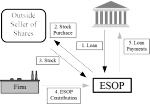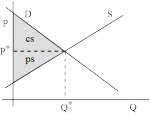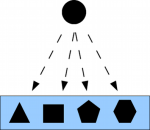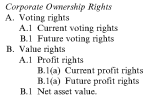Chomsky’s mechanism (and embryonic development) are significantly different from the selectionist mechanisms of biological evolution or the immune system. Surprisingly, there is a very abstract way using two dual mathematical logics to make the distinction between genuinely selectionist mechanisms and what are better called “generative” mechanisms. This note outlines that distinction.
Zagreb Talk Sept 2014
These are the slides and a video of a talk in Zagreb Sept. 8, 2014 on green issues and ESOPs.
On a fallacy in the Kaldor-Hicks efficiency-equity analysis
This paper shows that implicit assumptions about the numeraire good in the Kaldor-Hicks efficiency-equity analysis involve a “same-yardstick” fallacy.
Parallel Experimentation
The theme of parallel experimentation is used to recast and pull together dynamic and pluralistic theories in economics, political theory, philosophy of science, and social learning.
Partitions and Objective Indefiniteness in Quantum Mechanics
The problem of interpreting quantum mechanics (QM) is essentially the problem of making sense out of an objectively indefinite reality–that is described mathematically by partitions. Our sense-making strategy is implemented by developing the mathematics of partitions at the connected conceptual levels of sets and vector spaces. Set concepts are transported to (complex) vector spaces to yield the mathematical machinery of full QM, and the complex vector space concepts of full QM are transported to the set-like vector spaces over ℤ₂ to yield the rather fulsome pedagogical model of quantum mechanics over sets or QM/sets.
Three Themes about the Mondragon cooperatives
This is a preprint of a paper developing three themes, capital structure, active learning, and spinoffs, with special attention to the Mondragon cooperatives.
Introduction to Partition Logic
This is an introductory treatment of partition logic which also shows the extension to logical information theory and the possible killer application to quantum mechanics.
On Property Theory
This paper is an introduction to property theory including the invisible hand mechanism which handles the initiation and termination of property rights in an on-going private property market economy. The Fundamental Theorem is that when Hume’s conditions of no involuntary transfers and no breached contracts are fulfilled, then the Lockean principle of people getting the fruits of their labor, i.e., imputing legal responsibility in accordance with de facto responsibility is satisfied. The major application is to the current system of a private property market economy based on the renting of persons, i.e., the employment contract.
This is a reprint of the paper in the Journal of Economic Issues in Sept. 2014.
Introduction to Logical Entropy
This paper, a reprint from the International Journal of Semantic Computing, introduces the logical notion of entropy based on the newly developed logic of partitions that is mathematically dual to the usual Boolean logic of subsets (aka “propositional logic”), and compares it to the usual Shannon entropy.







